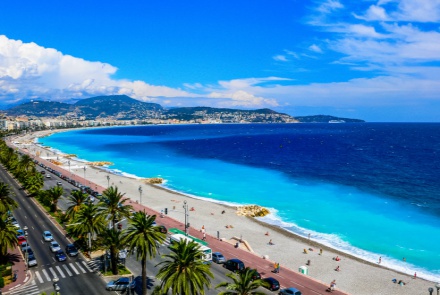Azure future.
France is one of the few countries where you can obtain citizenship without significant financial investments in the local economy. Nevertheless, the French passport has its own price, which is measured not only in euro.
The issue of obtaining a residence permit in the EU countries is still on the agenda of many Russians. Moreover, the choice of a country is often determined by extremely pragmatic conditions, such as:
- the complexity of the paperwork;
- time costs;
- minimization of financial outgoings;
- lack of language proficiency requirements;
- deadline for granting a residence permit.
A residence permit is considered as a kind of "ticket" to the EU countries, especially for that part of future migrants who do not associate the move with subsequent employment or real business.
And here, it is unexpected for many applicants for a residence permit that France is attractive because a long-term visa visitor (D-Visiteur visa) allows you to stay in the EU for the first year without any time restrictions. After a year, visa can be easily converted into a residence permit, in order to qualify for a French passport, you must continuously live in France for at least 5 years.
In this case, you do not need to invest in securities or business, organize companies or acquire real estate. There is no need to accumulate hundreds of thousands of euro in accounts and demonstrate proven passive income.
Direct costs: long-term rental housing, registration of medical insurance, payment of affordable state fees and preparation of documents. Naturally, the applicant must have the means to live in France, but these are reasonable amounts (measured in tens of thousands of euros), depending on the composition of the family, the “cost of housing” and the “appetites” of moving persons.
It is advisable that at the time of submitting documents to the consulate, the applicant should have these funds in a French bank. But this requirement is not mandatory.
The decision-making process on issuing a visa does not provide for an interview with the applicant, but is usually limited to a telephone conversation with a representative of the consulate, which is often crucial.
It is a mistake to assume that the French immigration commissioners are ready to issue a visitor visa to everyone, without exception, without going into the purpose of moving and without delving into checking the financial condition or reliability of the applicant.
Any suspicion, inaccuracy, incorrectness, an extra phrase in a telephone conversation, and - notification de refus becomes very likely, though with the possibility of appeal in the manner prescribed by law.
Where to move.
So, a visitor's visa is a perfectly acceptable option for obtaining a residence permit. Well, where to move to France? For most wealthy migrants, the answer is obvious - of course, to the Cote d'Azur.
The French Riviera is attractive, primarily due to location: the flight to Nice takes several hours, next to it is the Principality of Monaco and the Italian border (San Remo, Genoa, Milan). Among its advantages are a high level of business activity, a rich cultural life, as well as a mild Mediterranean climate.
Of course, life on the Cote d'Azur is an expensive pleasure. But, in general, if you are used to a comfortable life in Russia and are not ready to deny yourself the many pleasures inherent in the Riviera, then the cost of staying in the south of France will be quite comparable to the cost of a premium lifestyle in our country.
Purchasing housing on the French Riviera is a very troublesome and time-consuming activity. Finding a monastery that meets conflicting "family" requirements is not an easy task.
If housing is in a new building, then, as a rule, it is placed far from the center of business and cultural activity. If you are looking for an apartment in a house with a history - be prepared for a major overhaul: sometimes the costs of it are comparable to the price of the object.
If repairs are unavoidable, assessing the “scale of the disaster” is virtually impossible without the help of builders. Their conclusion can affect not only the final price, but also the fundamental decision on the appropriateness of buying an object.
Starting a search for a roof over your head, you should take care of credit resources for buying a home. French banks are very willing to lend for the purchase of real estate. But you should immediately make a reservation: the local banking bureaucracy at any time is ready to turn even your usual bank's payment into a multi-day headache.
In connection with the purchase of housing, another question arises: on whom and how to register housing. The reason: to provide management of the purchase in their own interests or in the interests of relatives. For this, in France there are SCI companies created for the ownership and management of real estate.
However, buying a house is not necessary: you can limit yourself to a long-term lease. At first glance, this may seem strange, but even when renting a house, it is advisable to find out: whether housing is pledged to the bank? The fact is that many owners of luxury real estate on the French Riviera are very willingly take a loan against security of their expensive property.
Most of them live far outside of France and do not always fulfill their obligations to creditors. In this case, you have a real chance to get acquainted with the bank representatives and talk with them about the legality of your stay in specific premises right at the sealed doors of the rented villa.
Tax issue.
It should not be forgotten that when buying real estate, the new owner immediately comes into the view of the French tax authorities. There is no doubt that the interest of tax authorities is directly proportional to the cost of housing. But do not count on tax indulgence if you are not buying a palace, but a modest apartment on the outskirts of Nice.
It is also worth don't forget about the wealth tax or, as it is sometimes called, a luxury tax. In October 2017, the French parliament introduced significant changes to the law, which should come into force in the coming months. The “exemptions” promised by President Emmanuel Macron should add to the fact that the “new” luxury tax will only be connected to real estate and will be transformed from property tax l'impôt sur la fortune (ISF) to property tax l'impôt sur la fortune immobilière ( IFI).
Thus, the tax base will be:
- property owned by the taxpayer;
- the ownership of companies or shares of companies (established in France or abroad), directly or indirectly owned by the taxpayer, and to which (companies) own real estate.
At the end of December 2017, the procedure for transferring information between the tax authorities of France and Russia was activated. So, if the move is planned in 2018, then this circumstance should be unconditionally taken into account.
A little bit about the "social security system".
Health insurance is a relevant topic, especially when it comes to family. Children, grandfathers and grandmothers are the main applicants for visiting doctors, which means that they are the most active customers of insurance companies. It should be noted right away that it will not be possible to save on elderly family members, since most companies generally refuse to insure persons aged 65 years or more (the exception is regular customers). This problem is completely solvable, but the rates of insurers for age-related clients are significantly different from ordinary ones.
If you have school-age children, you should keep in mind that studying at school is a prerequisite. To find a school for child on the Cote d'Azur is not a problem. The problem is that school (you have chosen) accepted the child. The fact is that for admission to a prestigious educational institution sometimes you have to “stand in line”. So it’s advisable to start dealing with the issue of choosing a school as early as possible (before moving).
No less important is the language issue. Knowledge of French is unlikely to be useful to tourists on the Cote d'Azur. But if you expect to obtain permanent residence or citizenship, then learning the language will still have to spend both time and energy.






